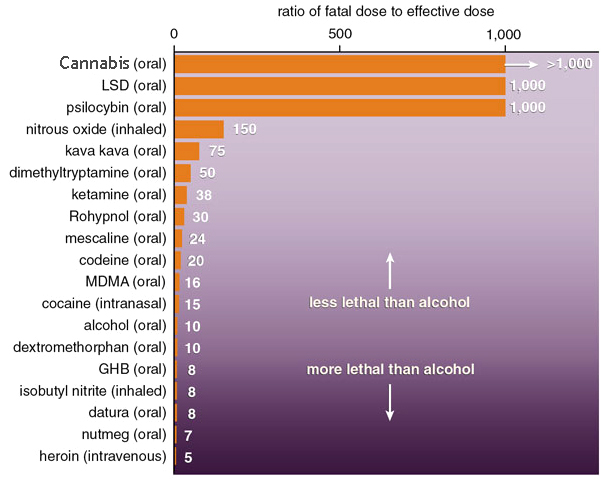One of the most common methods by which the 'danger' inherent in a particular drug (Cannabis sativa L., is an annual herbaceous plant, i.e., a herb) is objectively measured within the medical community is the rate at which it kills those who consume it. This is measured by the LD-50 rating which indicates the dose necessary to kill 50% of test animals “as a result of drug-induced toxicity”.
Over twenty-five years ago, in a 1988 ruling, the United States Drug Enforcement Agency (DEA) Administrative Law Judge Francis L. Young detailed the amount of Cannabis purportedly necessary to achieve a level of toxicity that might cause death in humans:
“At present it is estimated that marijuana*’s LD-50 is around 1:20,000 or 1:40,000. In layman terms this means that in order to induce death a Cannabis smoker would have to consume 20,000 to 40,000 times as much Cannabis as is contained in one Cannabis cigarette. A smoker would theoretically have to consume nearly 1,500 pounds of Cannabis within about 15 minutes to induce a lethal response”.
Not convinced? According to the US National Cancer Institute,
“Because cannabinoid receptors, unlike opioid receptors, are not located in the brainstem areas controlling respiration, lethal overdoses from Cannabis and cannabinoids do not occur”.
More research has indicated additional reasons why humans don’t die from Cannabis poisoning. In 2014, the journal Science published results from French researchers in a study, Pregnenolone Can Protect the Brain from Cannabis Intoxication, which documented the discovery and presence of a natural hormone that reverses Cannabis intoxication - in rats, at least. According to the researchers:
“When the [rat] brain is stimulated by high doses of THC, it produces pregnenolone - a 3,000% increase - that inhibits the effects of THC.”
Regardless of a reader’s stance on medical or recreational cannabis, a firm grasp of the facts is necessary to overcome an abundance of misinformation - particularly from mainstream media and those with a vested interest in keeping Cannabis illegal (researchers and government/s reliant on 'donations' from pharmaceutical companies, for example). Harking back to the words of Judge Young:
“Marijuana*, in its natural form, is one of the safest therapeutically active substances known to man.”


great hempformation! all the bast!! http://hempology.org/CANNABISCURRICULUM.html
ReplyDelete